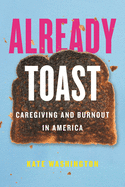
Already Toast: Caregiving and Burnout in America is writer Kate Washington's deeply honest, beautifully articulated story of her sudden transformation from an energetic, happily married, career-focused mother of two into a lonely, isolated and exhausted sole caregiver to a chronically ill husband and young children traumatized by their family's health crisis. Offering historical, classic literary and contemporary perspectives on caregiving within the broader context of feminism and U.S. politics, Already Toast is a courageous battle cry, a call for greater recognition of, and support for, the invisible army of caregivers nursing America's ill, disabled and elderly populations.
Washington begins in late summer 2014, before cancer wedged itself into her family and forcibly reconfigured its priorities. A gifted storyteller, she paints a charming portrait of life in Northern California with her husband, Brad, and their daughters, the youngest about to start elementary school. Brad was a tenured English literature professor at Sacramento State University, while Washington successfully juggled her parenting and home responsibilities with a prosperous freelance writing career. She was still fragile after her mother's suicide a few years earlier, but the future looked bright. Working toward a more equitable marriage was one of the couple's ongoing goals, a mission that was sidelined with Brad's diagnosis of blood cancer in 2015, a lymphoma so rare it did not have a name.
For the next two years, Washington set aside her cherished writing career to care for Brad full-time, not because she chose to do so, but because there were no other reasonable options available to her within the U.S. healthcare system, despite her family's excellent medical insurance benefits. After extended hospital stays for a ruptured tumor and near-fatal complications from a stem cell transplant, Brad was sent home despite requiring 24-hour care.With minimal, inadequate training and no support, Washington was compelled to perform skilled nursing tasks, such as administering life-saving intravenous antibiotics and nutrition to her husband, while also navigating a complex web of medical insurance claims and hospital bills. It became a challenge to care for him without losing herself. Self-care was at the very bottom of an overwhelming list of priorities, while exhaustion and depression became a natural part of her life.
The reality for Washington was that the extended period of caregiving stripped away more than just her career. It also erased her identity as a person with dreams and desires of her own and alienated her from friends. Unprepared for the ways in which caring for Brad would take a toll on her personhood, Washington is blunt in her assessment: "Even motherhood... hadn't erased me so thoroughly." The author's devastating honesty is complemented by her ability to see humor in situations where all-consuming despair would be an understandable response. Recounting the time when a mummified bat fell out of the attic and terrified her and the children, Washington cuts herself some slack: "I would love to be someone who can calmly dispose of a dead bat, but I wasn't a great feminist role model that night."
Under constant pressure to be sunny and upbeat, the author found herself performing the roles of "Good Caregiver, Good Mom or Good Woman" around the clock. Contrary to the feminist narratives of our times, she notes, women in the U.S. are assumed to be natural caregivers and expected by society to give up jobs, ambitions and their hard-earned autonomy to care for family members, performing unrecognized and unpaid labor that endangers their own health and wellbeing. She points out that a well-intentioned but inexperienced caregiver can be dangerous for patients; it's only a matter of time before burnout makes the caregiver even less capable of performing the crucial role of keeping their loved one alive. Washington is pitch perfect in her blunt assessment of the shortcomings in America's callously individualistic approach to health and long-term care and its glaring lack of a social safety net for chronically ill Americans and their caregivers. She offers comprehensive, realistic federal policy suggestions, citing examples of states that are heading in the right direction, as well as countries such as Japan, which has adopted a more humane, community-oriented approach to caregiving, and Belgium's generous leave policy providing up to 12 months of paid leave for caregivers.
Washington ingeniously weaves throughout Already Toast entertaining as well as comforting references to female caregiving characters in her favorite literature, books she knew intimately during her academic studies but rediscovered through a different lens during Brad's illness. Fans of Jane Eyre, Middlemarch, Little Women, Anne of Green Gables and the beloved children's book Madeline will enjoy Washington's engaging, spirited discussion of caregiver models prevalent in Victorian times and beyond.
Washington generously shares the caregiving resources she discovered on her steep learning curve, hoping to make the path easier for those who come after her. Ambitious in scope, Already Toast outlines a reasonable roadmap for the future of caregiving in America combined with engaging prose that captures the complexity of one woman's struggle to maintain her "wavering sanity" while experiencing severe burnout. --Shahina Piyarali

